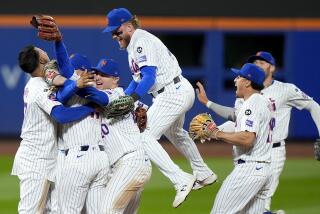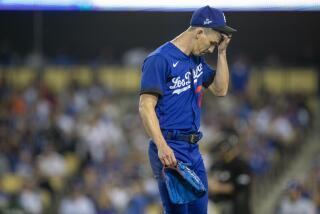BASEBALL / ROSS NEWHAN : Warning Signs on Strawberry Were All Too Clear
The highlights and statistics of Darryl Strawberry’s career span seven pages in the Dodger media guide.
If chronicled properly, however, Strawberry’s actions would require a book. Among the items missing from the Dodgers’ abridged version:
--August 5, 1985: Fined $500 by the New York Mets for being late to batting practice.
--March 22, 1987: Fined $500 by the Mets for skipping a spring training workout, then fined $1,000 more for leaving camp in protest of the first fine.
--June 9, 1987: Fined $250 by the Mets for being late to batting practice before a game in Chicago.
--March 3, 1989: Fined $750 by the Mets for skipping a spring workout.
--Sept. 18, 1989: Fined $500 by the Mets for leaving the bench and returning to the clubhouse during the ninth inning of a game in Chicago.
In all, Strawberry is known to have been fined seven times in his eight seasons with the Mets.
He also fought with Keith Hernandez, criticized his manager and teammates in national publications, was arrested for alleged assault with a deadly weapon during an argument with his wife, underwent alcohol rehabilitation in the spring of 1990 and was accused by teammates of quitting on the team when it was still in the race, sitting out the final six games of the 1990 season because of an alleged bad back for which he reportedly went to the trainer only once.
“Darryl didn’t want to mess up his L.A. thing,” then-Met infielder Tim Teufel said when he reflected on Strawberry’s behavior during that final week after Strawberry had signed with the Dodgers as a free agent for five years at $20.25 million.
The point is, Strawberry’s life had been an open book that the Dodgers undoubtedly read but disregarded, hoping the beat of his bat would drown out the beat of that drum he alone so often seemed to hear.
Strawberry produced a strong second half to give the Dodgers 28 home runs and 99 runs batted in in 1991. He has given them only headaches since.
Credit some of it to the frustrations of a legitimate back injury--maybe that final week of 1990 was an alarm the Dodgers should have heeded--but can they, should they, be surprised that he is again in his own time zone, heeding his own schedule, demonstrating bizarre behavior and comments?
Asked that, Executive Vice President Fred Claire said he had evaluated all aspects of Strawberry’s career.
“When you looked at his accomplishments and the fact he was in the prime of his career, I felt very good (about the decision to sign him),” Claire said.
“I felt he’d be a productive hitter for the length of the contract, and, indeed, he was a major factor in our ability to stay in the (1991) race until the last day. He was in the top 10 in the MVP voting that year.
“The (back) injury (he suffered last year) couldn’t be anticipated and was no one’s fault. Darryl had averaged 140-plus games (per season) with the Mets, which was another factor in our decision to sign him.
“Take any five-year slice of Darryl’s career, and you’ll find a productive player who was an important part of his team.”
Called up early in the 1983 season, Strawberry averaged 31.5 home runs and 92 RBIs with the Mets despite being burdened with the albatross of great expectations.
Strawberry has 2 1/2 years remaining on his contract with the Dodgers--at $3.5 million this year, $3 million next year and $5 million in 1995--and Claire hopes to get some of his money’s worth by making sure that Strawberry at least does the two hours of daily pregame back therapy that was prescribed.
Strawberry, then on the active list, had twice arrived too late to get it done before games this season. It happened in San Diego recently and he was scratched from the lineup, prompting him to bust up a clubhouse water cooler and exchange words with Claire.
When he failed to arrive until late in the game Thursday, he again angered Claire, who fined him a day’s pay, about $19,230, and threatened him with suspension, even though Strawberry is on the disabled list.
“I’m not trying to punish him,” Claire said later, his emotions having ebbed. “We have a responsibility to see that Darryl adheres to what needs to be done. The ballclub doesn’t help him by letting it slide, even for a day.
“We’ve stressed that repeatedly to Darryl, and he’s responded. His work ethic has been good. He’s put forth a lot of effort--three or four hours a day, even on off days. I want to believe he understands that he’s still a part of the team, and that the most important thing he does is the therapy.
“I know it’s difficult and there’s a lot of frustration there because he’s used to competing at a high level, but he’s not unique in that. Any injured athlete experiences it. He has to draw on his strength and discipline to meet the demands, and it’s tough because there’s not a daily payoff. I mean, it’s an accumulated payoff on a long-term basis. His career is at stake here.”
There have been too many twists and turns to predict how this story will end, but the Dodgers can’t say they weren’t aware of those twists and turns from the start.
BEST INTERESTS?
A strong and independent commissioner might see it differently, but Bud Selig, owner of the Milwaukee Brewers and chairman of the executive council, sees no reason to exercise baseball’s “best interest” powers and end the systematic devastation of the San Diego Padres by owner Tom Werner and colleagues.
Baseball has no problem, Selig said, with Werner trading Gary Sheffield for three basically unproven pitchers, or with the departures of Craig Lefferts, Randy Myers, Tony Fernandez, Benito Santiago and Darrin Jackson from a team that was only 4 1/2 games out of first place in the National League West on Aug. 1 of last year.
“This is a dramatic manifestation of the big-market, small-market problem,” Selig said, spouting the company line. “I understand the fans’ frustration, but Tom is trying to preserve the viability of his franchise and prevent an economic tragedy.
“I’ve seen it compared to Charlie Finley (whose attempt to sell Joe Rudi, Vida Blue and Rollie Fingers as owner of the Oakland A’s was blocked by then-commissioner Bowie Kuhn), but that was a liquidation.
“Here you have a club making trades, and while some of them seem one-sided, I understand what Tom is doing and I understand he has to do it to maintain the viability of the franchise.”
Has to do it to prevent an economic tragedy? Bold assertion, but where’s the proof?
Don’t San Diego fans, left with a shell of a major league team--first baseman Fred McGriff will probably be peddled next--deserve to see independently audited books to document that the club really lost $8 million or $6 million or $10 million last year, depending on what this week’s claim is?
Don’t they deserve to know how much depreciation and cash-flow benefits one of baseball’s wealthiest ownership groups has already claimed since buying the Padres for a modest $65 million in 1989-90?
Werner and colleagues have abdicated their responsibility to the people supporting the franchise. They have destroyed a contending team, and if they don’t want to play the game at today’s prices, they should be forced to sell.
The tragedy, to borrow Selig’s grandiose description, is that there is no one strong enough in baseball to bring an end to it, to go to bat for the fans’ best interests.
THE MARLINS’ SIDE
While the Padres head in another direction, there is no question about the wheeling and dealing of Florida Marlin owner Wayne Huizenga.
Already on a pace to break the Angels’ 1961 expansion record of 70 victories, the Marlins are looking to become competitive in a hurry.
“It’s not like we have an entire lineup of high-priced veterans,” General Manager Dave Dombrowski said. “Unfortunately, the way the game is, if you want premium players, you have to pay the price.”
The Marlins were already paying big-time salaries to Santiago and Bryan Harvey--and to a lesser extent to Walt Weiss, Charlie Hough and Dave Magadan, who has lost his position to Sheffield and will probably be traded. Sheffield makes $3.11 million this year and can become a free agent after the 1994 season if the same system is in place.
“There is some risk to it, but hopefully we can sign him to a long-term contract,” Dombrowski said, adding that Sheffield is a premium power hitter in the prime of his career.
“He makes us better, but we don’t figure to win it this year or next,” Dombrowski said. “We made the deal (giving up three pitchers from the expansion draft) on a long-term basis.”
Dombrowski also said he hoped the addition of a cornerstone player has ended trade rumors about Harvey, who has 22 saves and is another cornerstone in the Marlins’ building process.
“I’ve repeatedly said that we didn’t draft Harvey to trade him,” Dombrowski said. “I hate to never say never, but it would take an overwhelming offer. I’d be shocked if it happened.”
METS MOVE
The resignation of Al Harazin as the beleaguered general manager of the beleaguered New York Mets paves the way for the return of Joe McIlvaine, most recently the frustrated general manager of the Padres and previously an architect of the Mets’ championship teams of the ‘80s.
McIlvaine faces a long and difficult task. With a $39-million payroll, the Mets are averaging $1.8 million a victory. Bret Saberhagen compared his hapless team to a “circus act” the other day, and John Franco punched a clubhouse wall in frustration and embarrassment.
Meanwhile, a banner hung in Shea Stadium read, “Young and the Hopeless.”
That was a reference to Anthony Young, who has set a major league record for futility with 23 consecutive defeats, 12 in relief and 11 as a starter. Young has made 71 appearances since his last victory, in 1992, but deserves better. Twelve of the 36 runs scored against him this season have been unearned, and his 4.08 earned-run average isn’t that much worse than the 3.77 of 11-game winner Jack McDowell.
DRAFT DELAY
Only five first-round selections in the recent June draft have signed so far as most wait to see how high agent Scott Boras, serving as their adviser, can take the top two picks--Alex Rodriguez, the Miami high school shortstop taken by Seattle, and Wichita State pitcher Darren Dreifort, selected by the Dodgers.
Both are trying to break the draft record of $1.55 million that the New York Yankees packaged for another of Boras’ clients, high school pitcher Brien Taylor. Rodriguez is believed to be seeking more than $2 million.
Boras’ selling line: “I’ve represented Jay Bell, Mark Lewis and Bip Roberts, but I’ve never before had a high school shortstop who I believe is ready to play in the big leagues right now.”
First-round signings: No. 12, Ferrum (Va.) College pitcher Billy Wagner by the Houston Astros for $600,000; No. 18, St. Paul high school outfielder Chris Schwab by the Montreal Expos for $425,000; No. 22, South Carolina high school outfielder Charles Peterson by the Pittsburgh Pirates for $420,000; No. 24, LeMoyne University pitcher John Ratliff by the Chicago Cubs for $355,000, and No. 25, Florida State pitcher John Wasdin by the A’s for $375,000.
More to Read
Go beyond the scoreboard
Get the latest on L.A.'s teams in the daily Sports Report newsletter.
You may occasionally receive promotional content from the Los Angeles Times.










